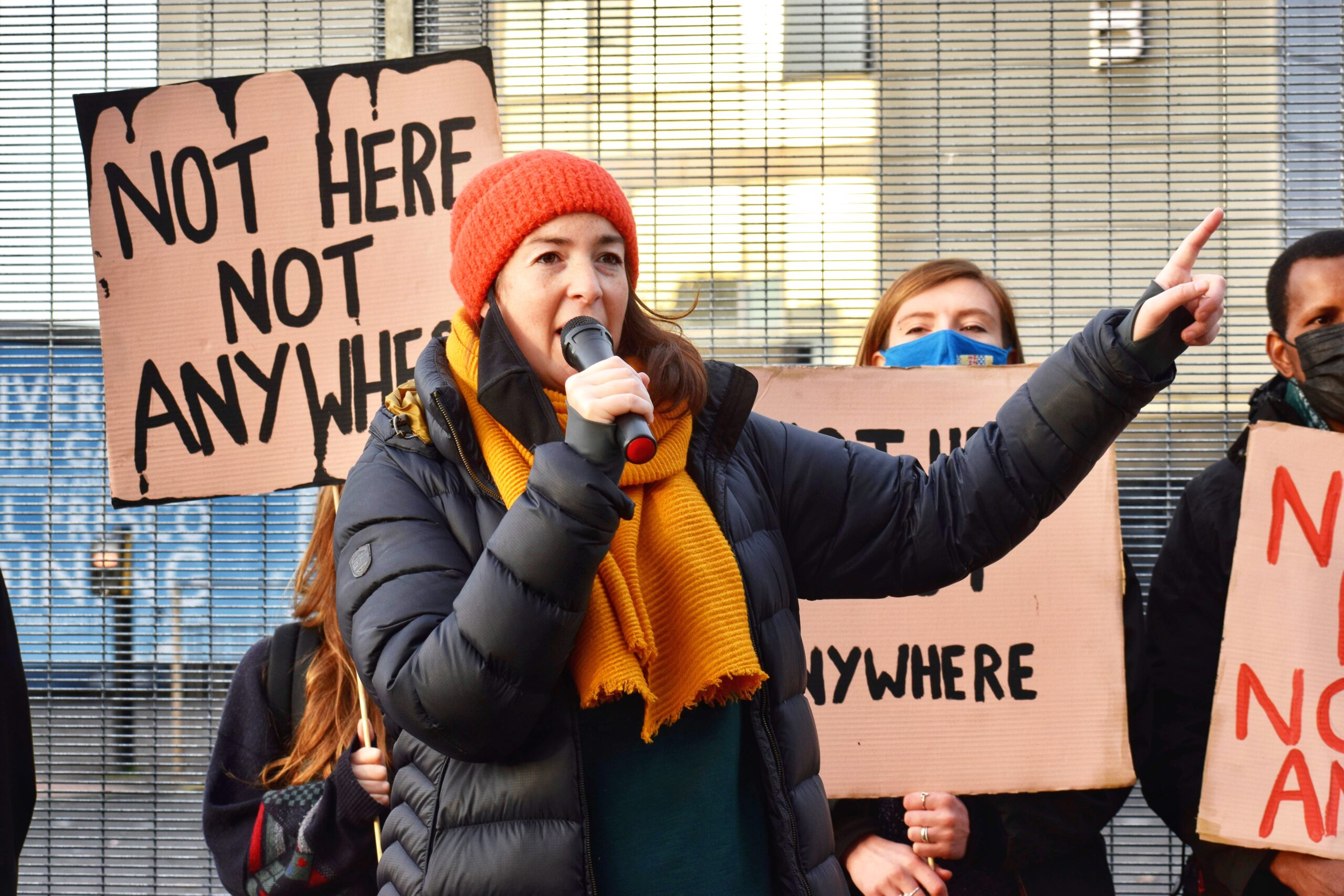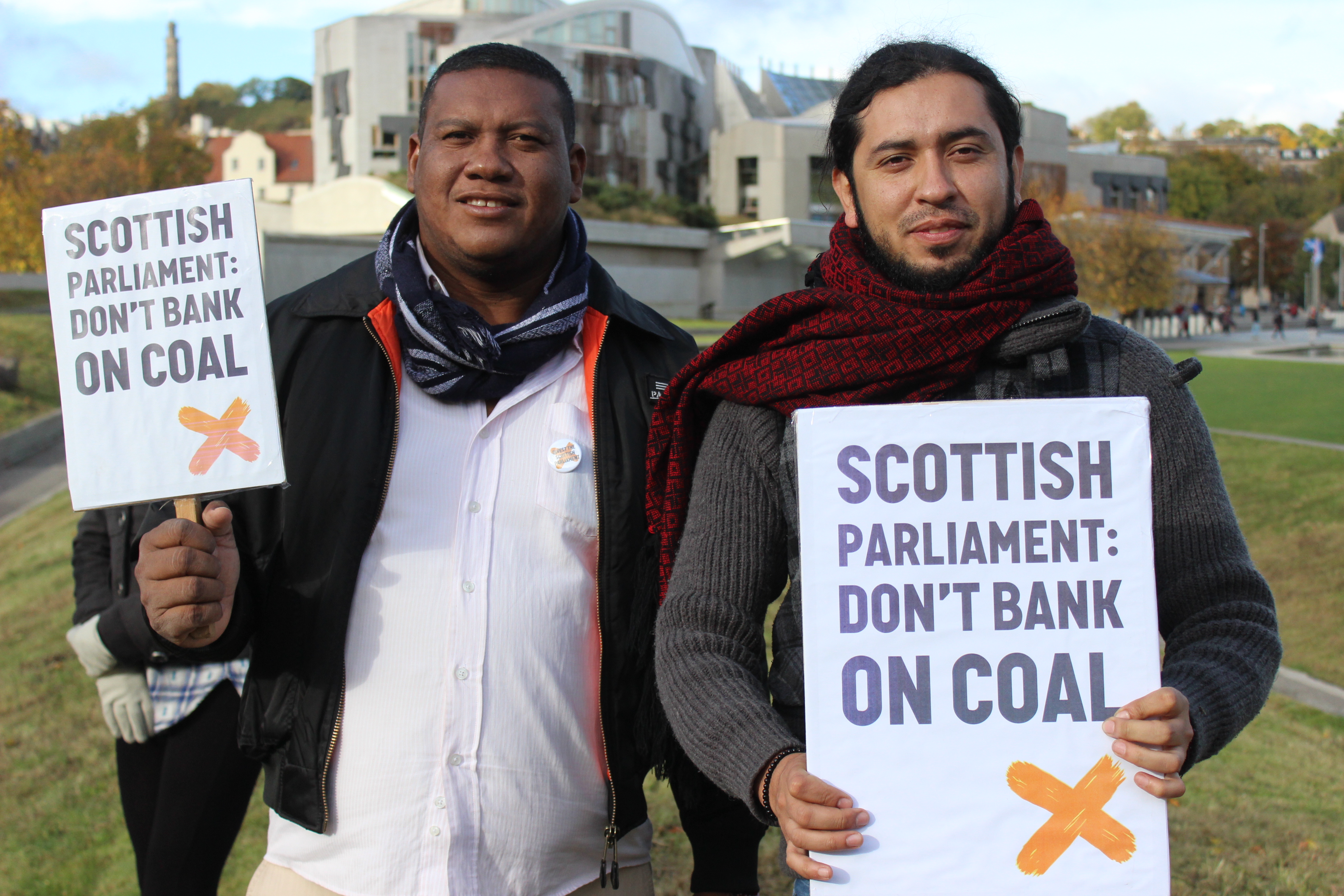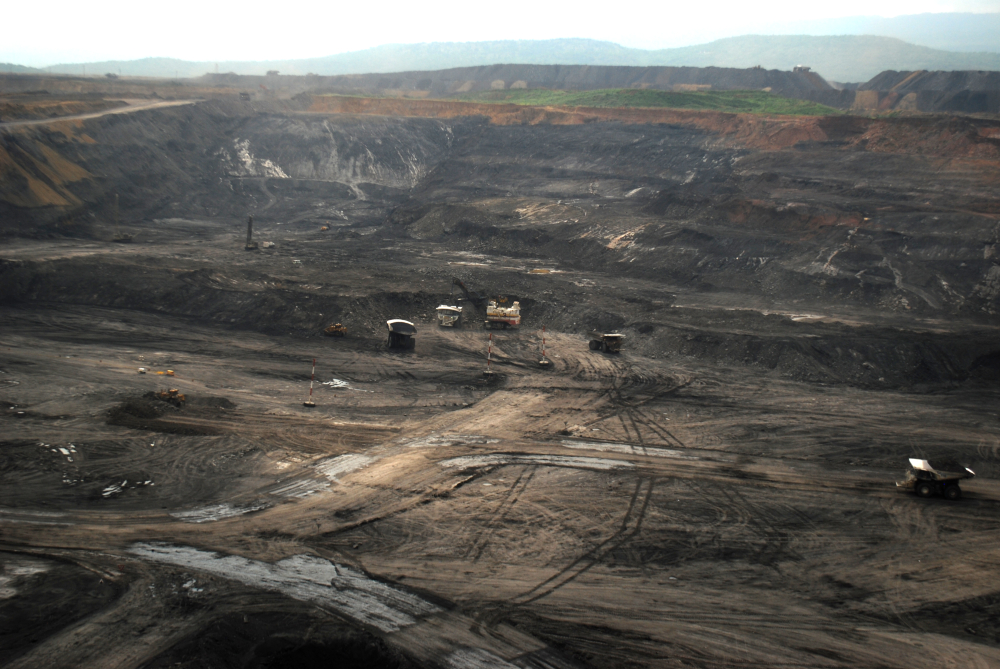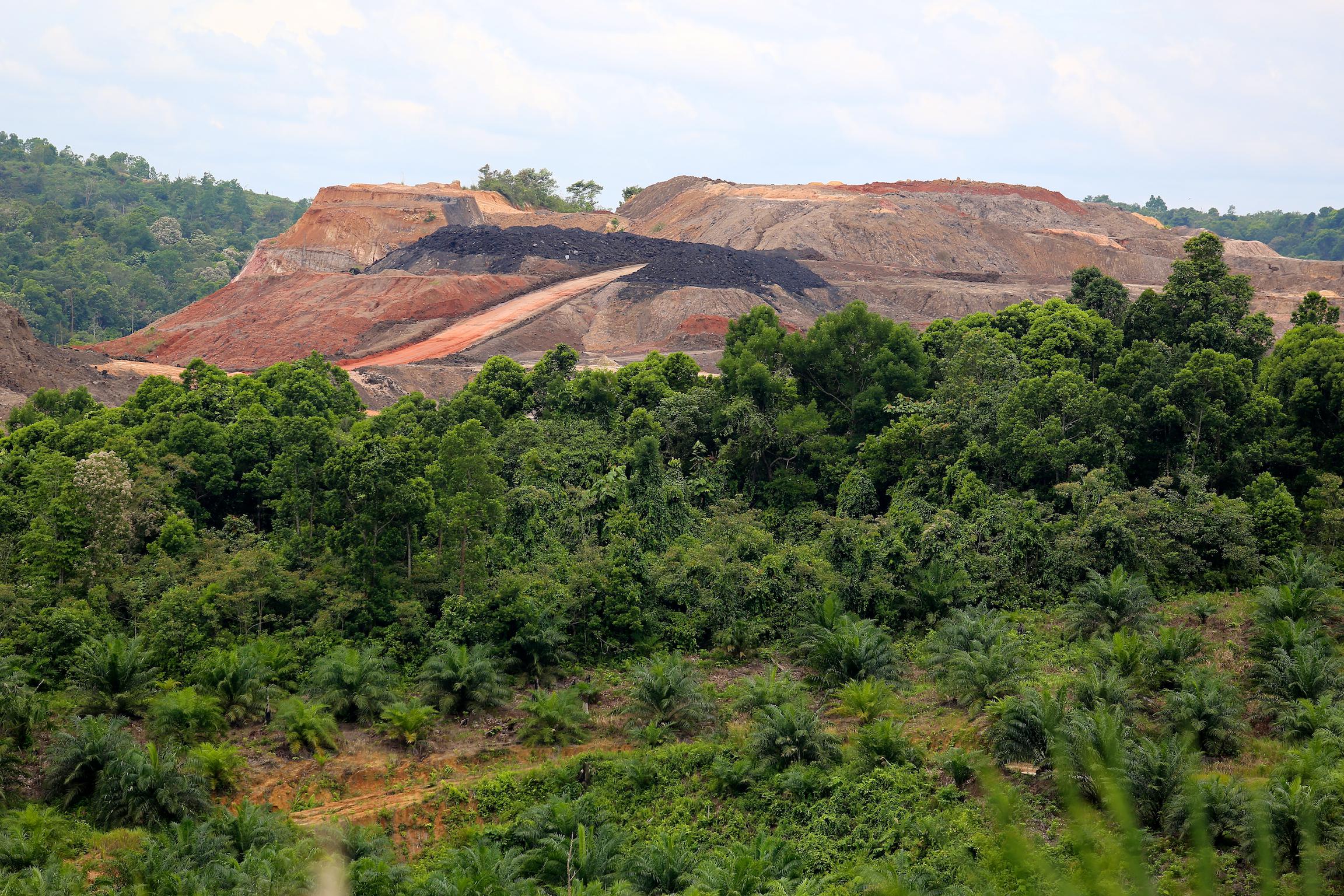
Where your money goes: the toxic toll of BHP Billiton in Borneo and Colombia
- By Emilie Tricarico and Stuart Anderson

BHP Billiton is the world’s largest mining company. Partly based in the UK and funded by Scottish funds, including the Scottish Parliament own pension fund, it seemed an appropriate company to look at in more detail during the Divest Scotland Tour, October 2015.
During the tour Samuel Arregoces and Danilo Urrea joined us from Colombia to speak out against the disastrous impact of the mining giant in their communities.
Samuel is from the village of Tabaco, a community of small-scale farmers of African descent which was brutally evicted in 2001 to make way for expansion of the massive Cerrejon opencast coal mine, now jointly owned by BHP Billiton. Danilo of CENSAT (Friends of the Earth Colombia) campaigns to reform the Colombian Government’s mining policies.
Samuel said: “The story of the coal mining in Colombia has been 30 years of destruction, 30 years of sadness, 30 years of pain. The mining company has privatised our water. We cannot grow on our land and the little land we have left is contaminated. We cannot live a healthy life; the water, rivers and streams and waters are polluted. We are uprooted.”
Danilo said: “One person in La Guajira can use less than 1 litre of water per day. The Cerrejon mine uses more than 30 million litres in a single day. The extractive industries are not sustainable; they create voluntary systems that pretend to be sustainable, but really the negate the rights of the communities.”
BHP Billiton in numbers
According to Forbes, BHP is the largest public mining company in the world and has the worlds’ sixth largest reserves of coal. It has in the region of 16 billion tonnes of coal in reserves, which if burnt would release 44 billion tonnes of carbon dioxide emissions.
The company is primarily focused on the extraction of oil, coal, iron ore and copper, but is also a major producers of silver, lead, uranium and zinc. In 2013, the Guardian listed BHP Billiton as one of the 90 companies responsible for 63% of global greenhouse gas emissions from the beginning of the industrial age until 2010.
In August 2015 BHP Billiton’s shares hit a seven year low following a stark downturn in annual profits. It’s been reported that the company has found itself needing to raise $6.5 billion to cover capital spending and high dividends.
However, despite deteriorating markets in aluminium, copper and nickel, and the slowing of China’s economy and demand for commodities, it was reported that in 2015 BHP still planned to extract 80 million tonnes of coal.
Colombia: 30 years of exploitation in Cerrejòn, La Guajira

The Cerrejòn coal mine, opened in 1976 in the province of La Guajira in northern Colombia, is one of the largest coal mines in the world and the largest in Latin America.
The Guardian reports that the mine produces on average 32 million tonnes of coal per year, of which around 60% is exported to Europe.
The coal dust emitted from Cerrejòn’s mining operations may present several threats to the local population’s health and their surrounding environment in relation to respiratory diseases, disruption of traditional agriculture and water contamination.
Cerrejòn has a catalogue of reports of repressive policies towards local communities through forced evictions and resettlements, as well as loss of livelihoods and threats against critical views over its operations.
Cerrejòn covers a territory that stretches over several indigenous communities including the African-descent village of Tabaco. Samuel, from the community, told audiences his story of being brutally evicted by local police and security guards in 2001. Despite Intentional calls for the village to be rebuilt, and court orders to that effect, Cerrejòn appears not to have offered a suitable home to the people of Tabaco.
The Wayùu community, whose territory spreads across 8,000 square miles in Colombia, are particularly present in the province of La Guajira. The Wayùu people have strong spiritual and traditional values, which have frequently been ignored by the Cerrejòn mining company. Colombia has ratified the International Labour Organisation Convention 169, giving indigenous peoples the right to participate in regional plans and programs affecting them, yet Wayùu say they remain excluded from decision making processes in Cerrejòn.
In October it was reported that a judge in the Municipal Court in Barrancas ruled in favour of plaintiffs ordering that the mining company Cerrejon company reduce its pollution levels over a maximum two months period with respect to the protection of constitutional rights. The case concerned a two year-old child from the local Wayùu community who suffers from severe respiratory problems. The court also ordered that the company take appropriate measures to address the damages caused to the nearby residents of the so-called mining corridor.
In 2005 BHP Billiton signed the Voluntary Principles on Security and Human Rights and later adopted the Social and Environmental Standards of International Finance and the United Nations’ Guiding Principles on Human Rights and Business.
Those principles contain non-compulsory measures that imply, amongst others, for companies to work in accordance with human right norms and provide for adequate staff training. However residents of local communities still complain about the absence of resolution over conflicting issues of relocation and the maintenance of agricultural livelihoods. Most recently, the mine’s expansion led to the reported eviction of Roche, another local village, whose inhabitants were brutally forced out of their native residency.
Following the strong resentment among the indigenous communities towards the mine’s policies, those populations formed FECOMIDEGUA, the Federation of Communities Affected and Displaced by Mineral Exploitation in La Guajira. The collective, later joined in 2011 by other trade union groups and local communities associations, showed strong opposition to the planning of further expansion for the mine.
While the company maintains that the mine’s activities bring prosperity to the area the region of La Guajira remains one of Colombia’s poorest states with 67% living in a state in poverty.
Borneo: Mining in the heart of the rainforest

Indonesia is one of the largest exporters of coal in the world with exports increasing by three times between 2005-2013. BHP Billiton, as stated in its 2010 Alternative Annual Report, owns seven mining concessions stretching across 355,000 hectares in Central Kalimantan a province in the southern part of Indonesian Borneo.
In 2010, the company planned to create a new joint venture for its Indonesian Coal project, in which PT Adaro Energy TBK would own 25% and BHP the remaining 75% of shares. The Indomet project is located in the heart of Borneo, home to the indigenous Dayak people. The area is famous for its pristine biodiversity with orangutans, pigmy elephants, clouded leopard and other endangered species resident.
The IndoMet project reputedly stretches over 75,000 hectares of primary forest and several villages, whose livelihoods strongly depend on this rich natural ecosystem and clean fresh water from the Barito river, around which 1.3 million people live.
BHP’s mega-project in Kalimantan, a region where mining is contributing to the thousands of square miles of deforestation, is strongly criticised by environmental organisations and mining advocacy groups. Friends of the Earth groups have stated that the project will contribute to the loss of priceless biodiversity, and important species that we are only beginning to understand.
Putting those fragile ecosystems at risk without the insurance for long-term viability of the project is utterly irresponsible from BHP Billiton’s part.
The Indomet project has been highly criticised in a Greenpeace report arguing that the company pushes for a “point of no return” with its plan for massive-scale coal expansion in Indonesia, which is at odds with the country’s own climate targets. The report documents a 20% surge of coal production in Indonesia since 2000. The planned increase in coal exports would represent an additional 460 Mt of carbon dioxide, as much as the whole of the UK’s emissions for 2010.
While BHP Billiton started work at the Haju mine, the first step in the IndoMet project, the company is still discussing working regulations with the Indonesian government and waiting for amendments to a series of new mining regulations to proceed further.
Ongoing scandals: China, America and Brazil
As well as suffering sharp falls in profits, BHP Billiton has been caught in a number of scandals in recent years.
The company was reportedly involved in a bribery case surrounding the 2008 Olympic games in Beijing. It funded the attendance of 176 government officials and members of state owned enterprises, an illegal act for which, the company was found guilty of breaching the US anti-bribery law. Although BHP agreed to pay $25 million in charges, the company never admitted nor denied the conclusions of the inquiry conducted by the US Securities and Exchange Commission.
In 2009 BHP Billiton and two other American energy firms were apparently found to have forged letters lobbying members of Congress. A lobbying firm acting on behalf of BHP wrote to the 12 congressmen claiming to be from grassroots political groups. Despite their actions the bill was approved by the US House of Representatives in June 2009.
On 5 November 2015 a dam burst at an iron or mine in the province of Minas Gerais, Brazil, releasing a mix of mud and mining waste stretching across 400 mile of the river Doce. The mining company Samarco, where the incident took place is jointly owned by BHP and the Brazilian giant Vale. While last news report the death of 13 people, hundreds of thousands of people are still believed to be left without access to clean water. According to the Brazilian Minister for the Environment, the disaster is the worst environmental accident in the country’s history.
More information about BHP Billiton and divestment:
- BHP Billiton: Alternative Annual Reports
- Indo Met: Mining the Heart of Borneo
- Dirty Money: Interactive Web Documentary
- London Mining Network
- Divest Scotland campaign website
About the Authors:
- Emilie Tricarico campaigns for divestment from fossil fuels and against TTIP. Having completed a Masters in Corporate Environmental Management at the University of Surrey she is particularly concerned with the ways local communities are impacted by multinationals and their strategies to resist corporate abuse.
- Stuart Anderson is currently studying an MSc in Sustainability and Adaptation. He is interested in how the principles of permaculture, strategies for localized renewable energy networks and urban agriculture practices can create resilient local communities in a globalised world.
